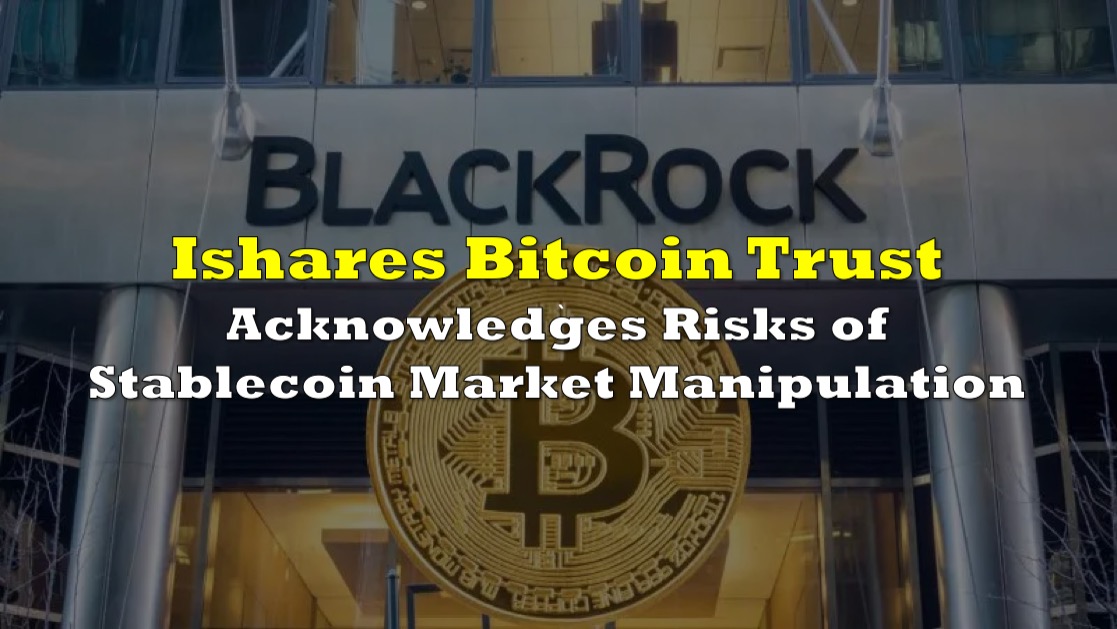BlackRock’s iShares Bitcoin Trust (IBIT) has surpassed the $1 billion assets under management (AUM) mark, making it the first among the recent cohort of bitcoin exchange-traded fund (ETF) providers to achieve this milestone. Despite the rapid success, concerns linger over potential risks associated with stablecoin market manipulation, as highlighted in the prospectus.
IBIT, which commenced trading on January 12, has quickly gained traction in the market, closing Friday’s session at $23.32 with assets under management of $1.03 billion. Robert Mitchnick, Head of Digital Assets at BlackRock, expressed enthusiasm about the achievement, stating, “We are excited to see IBIT reach this milestone in its first week, reflecting strong investor demand. This is just the beginning. We have a long-term commitment focused on providing investors access to an iShares quality ETF.”
The fund’s holdings primarily consist of 99% bitcoin, with an additional nearly $62,000 in fiat currency, totaling 28,622 tokens as of the latest update on Thursday. IBIT has reported an average daily trading volume of 14 million shares, trading at a slight premium of 0.42% relative to spot bitcoin.
However, the prospectus accompanying IBIT’s offering raises concerns about potential risks associated with the digital asset market. The document points out the unregulated nature and lack of transparency surrounding the operations of digital asset exchanges, highlighting the susceptibility to fraud, manipulation, security failures, or operational problems. The prospectus specifically mentions the stablecoin market as a source of potential risk.
— Bitfinex'ed 🔥🐧 Κασσάνδρα 🏺 (@Bitfinexed) January 17, 2024
Quoting the prospectus directly, it states, “Due to the unregulated nature and lack of transparency surrounding the operations of digital asset exchanges, which may experience fraud, manipulation, security failures or operational problems, as well as the wider bitcoin market, the value of bitcoin and, consequently, the value of the Shares may be adversely affected, causing losses to Shareholders.”
The prospectus further notes concerns about specific exchanges, with Bitfinex being cited as an example. It references academic research highlighting evidence of manipulative trading activity on certain bitcoin exchanges, underscoring the broader risks associated with false trading and potential fraudulent acts in the digital asset exchange market.
“In August 2017, it was reported that a trader or group of traders nicknamed ‘Spoofy’ was placing large orders on Bitfinex without actually executing them, presumably in order to influence other investors into buying or selling by creating a false appearance that greater demand existed in the market. In December 2017, an anonymous blogger (publishing under the pseudonym Bitfinex’d) cited publicly available trading data to support his or her claim that a trading bot nicknamed ‘Picasso’ was pursuing a paint-the-tape-style manipulation strategy by buying and selling bitcoin and bitcoin cash between affiliated accounts in order to create the appearance of substantial trading activity and thereby influence the price of such assets,” the prospectus reads.
The prospectus also listed down what the Securities and Exchange Commission identified as possible sources of fraud and manipulation in the bitcoin market, including “manipulative activity involving purported ‘stablecoins,’ including Tether.”
Additionally, the document outlines worries about the stability of the bitcoin market, both globally and in the United States, citing the lack of comparable regulatory guardrails and safeguards on many bitcoin trading venues. It highlights potential vulnerabilities to larger and more frequent sudden declines compared to traditional asset exchanges.
The prospectus concludes with a stark reminder of the historical incidents where digital asset exchanges faced closure due to fraud, manipulative activity, business failure, or security breaches. The collapse of Mt. Gox, the theft from Bitstamp and Bitfinex, and the recent insolvency of FTX Trading Ltd. are referenced as cautionary examples.
Information for this story was found via CoinDesk and the sources mentioned. The author has no securities or affiliations related to the organizations discussed. Not a recommendation to buy or sell. Always do additional research and consult a professional before purchasing a security. The author holds no licenses.





